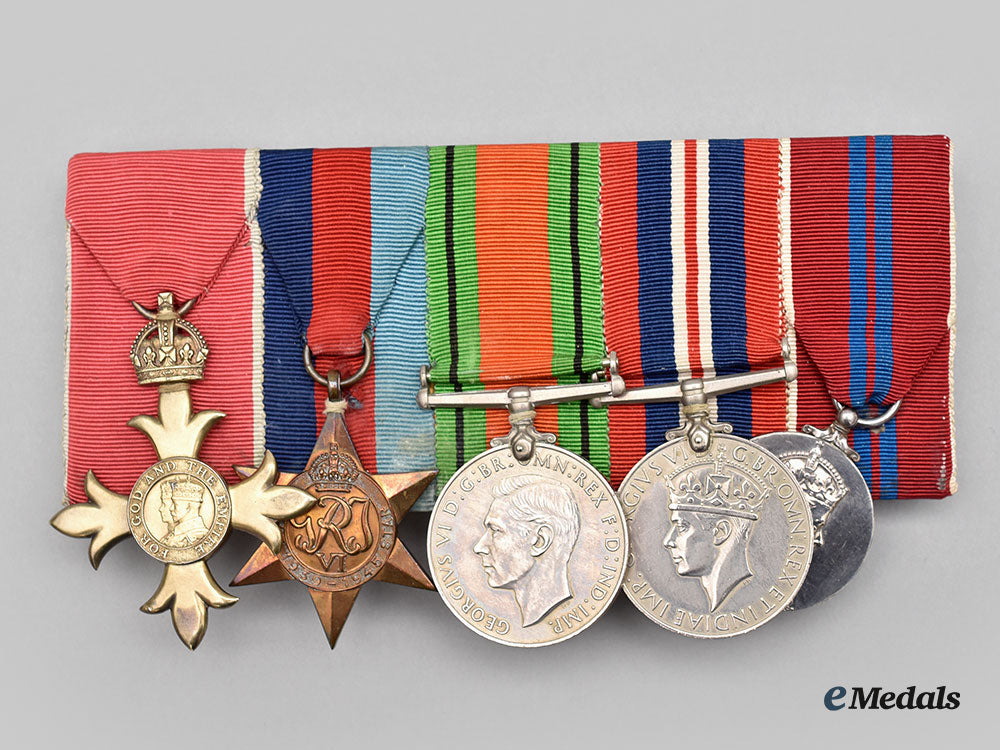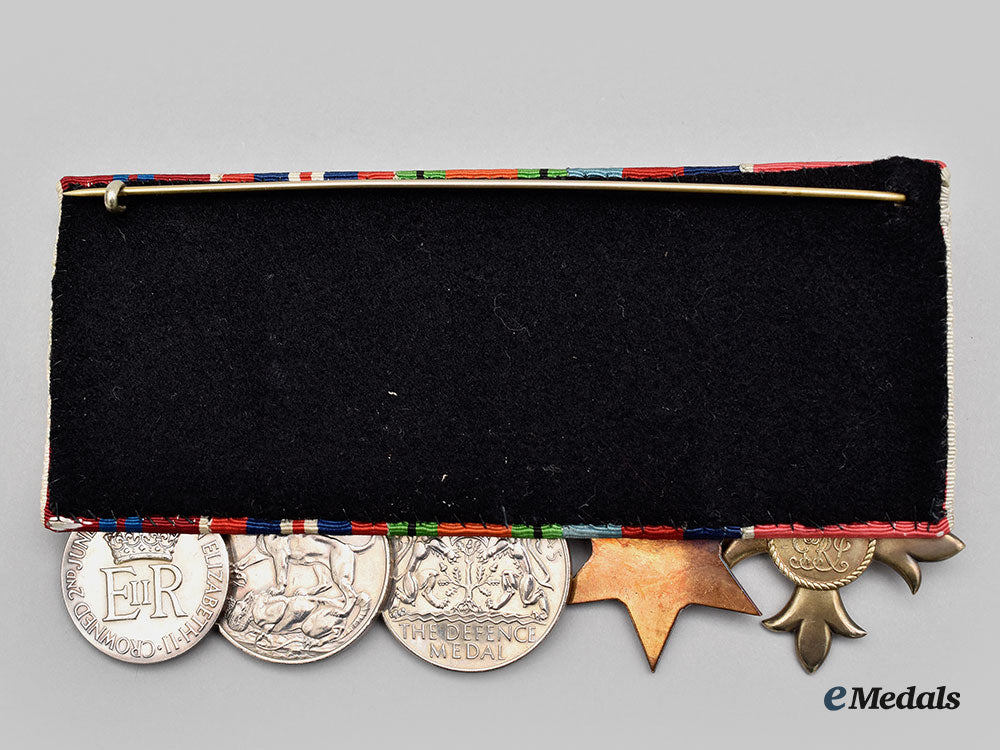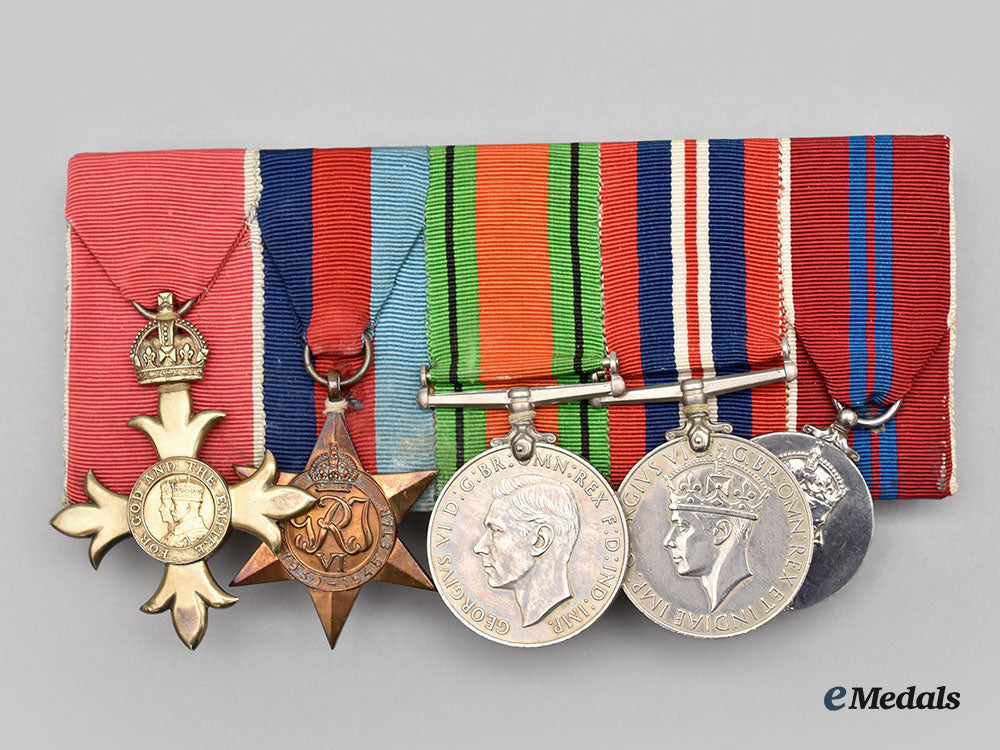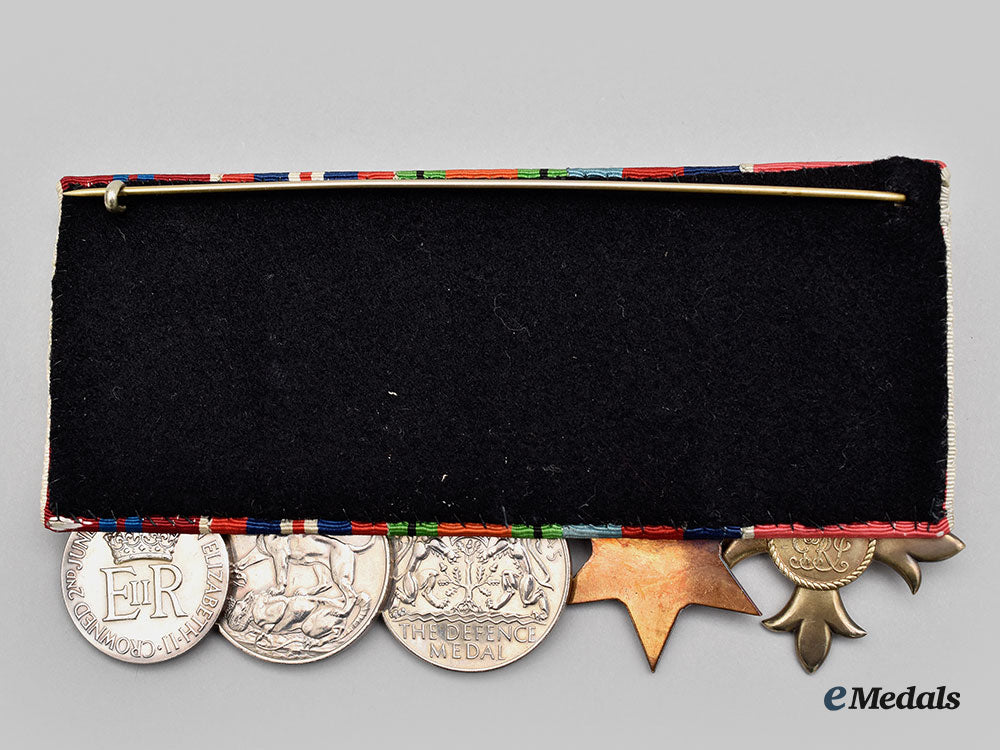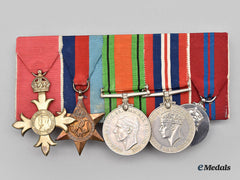
LOADING ...
In response to evolving domestic opinion, eMedals Inc has made the conscious decision to remove the presentation of German Third Reich historical artifacts from our online catalogue. For three decades, eMedals Inc has made an effort to preserve history in all its forms. As historians and researchers, we have managed sensitive articles and materials with the greatest of care and respect for their past and present social context. We acknowledge the growing sentiments put forth by the Canadian public and have taken proactive actions to address this opinion.
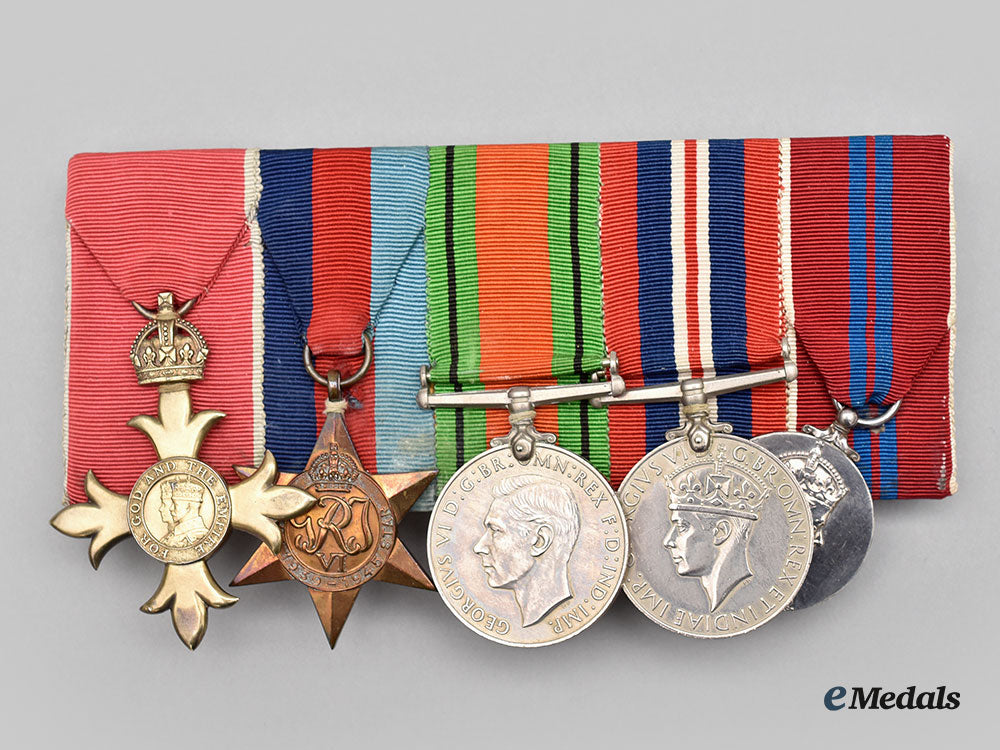
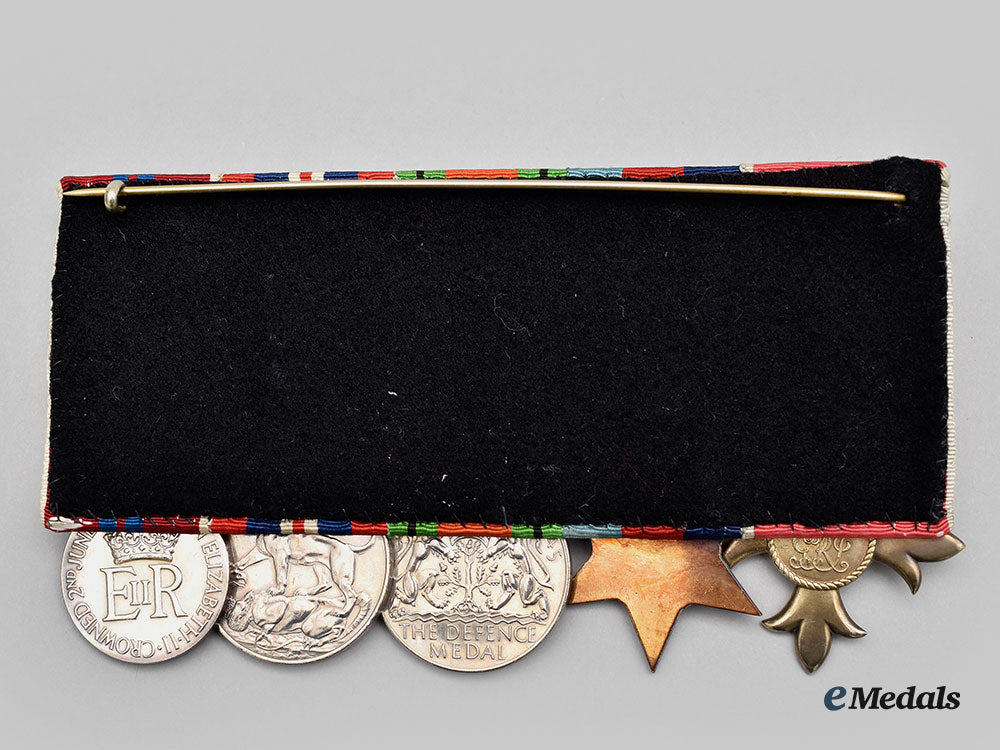
United Kingdom. An Obe Group Of Five, To Army Officer And Diplomat, Later A Cbe Recipient, Major Frederick Charles Leslie Chauncy Cbe
United Kingdom. An Obe Group Of Five, To Army Officer And Diplomat, Later A Cbe Recipient, Major Frederick Charles Leslie Chauncy Cbe
SKU: ITEM: GB7930
Current Bid:
Your Max Bid:
Bid History:
Time Remaining:
Couldn't load pickup availability
Shipping Details
Shipping Details
eMedals offers rapid domestic and international shipping. Orders received prior to 12:00pm (EST) will be shipped on the same business day.* Orders placed on Canadian Federal holidays will be dispatched the subsequent business day. Courier tracking numbers are provided for all shipments. All items purchased from eMedals can be returned for a full monetary refund or merchandise credit, providing the criteria presented in our Terms & Conditions are met. *Please note that the addition of a COA may impact dispatch time.
Shipping Details
eMedals offers rapid domestic and international shipping. Orders received prior to 12:00pm (EST) will be shipped on the same business day.* Orders placed on Canadian Federal holidays will be dispatched the subsequent business day. Courier tracking numbers are provided for all shipments. All items purchased from eMedals can be returned for a full monetary refund or merchandise credit, providing the criteria presented in our Terms & Conditions are met. *Please note that the addition of a COA may impact dispatch time.
Description
Description
Most Excellent Order of the British Empire, IV Class Officer Badge (OBE), Civil Division (in silver gilt, unmarked, measuring 49.5 mm (w) x 64 mm (h)); 1939-1945 Star; Defence Medal; War Medal 1939-1945; and Queen Elizabeth II Coronation Medal 1953. Court-mounted, with swing bar pinback as worn by the veteran, very light contact, original ribbons, near extremely fine. Accompanied by assorted paperwork of photocopied information from various publications and websites, along with a brief biography and a colour photocopied school photograph of Chauncy and four others pictured with four trophies, dated October 1921, with him seated in the middle.
Footnote: Frederick Charles Leslie Chauncy was born on December 22, 1904 in London, England. He is acknowledged as having been in the British Army from 1924 to 1928. As a young man, he was athletically inclined, affiliated with the Polytechnic Harriers of Westminster. At the 1925 AAA Championships, Chauncy finished fourth in the 120 yard hurdles and was selected for the match against France. In 1928, he fell heavily in his heat of the AAA 440 yard hurdles but was still chosen for the British Olympic team. He competed at the 1928 Summer Olympic Games in Amsterdam, where he reached the semi-finals but, following an unfortunate draw, he was eliminated by the athletes who took the first three places in the final.
Chauncy was first commissioned with the King's Regiment on August 27, 1924 at the age of 19 and was subsequently transferred to the Indian theatre on April 9, 1926, appointed to the Indian Army on May 27, 1927. Surprisingly, although now in the British Army, with his athletic prowess, he never won an Army athletic title. From 1928 to 1930, he served with the 45th Rattray’s Sikhs. As of February 13, 1930, he is documented as being in the rank of Captain on the Supplementary List, as an officer in civil employment, serving as Secretary to the Resident for Baroda and the Gujarat States (Political Department). An announcement appeared in the London Gazette 34006 of Tuesday, December 19, 1933, page 8218, from the Foreign Office, dated November 15, 1932: "The KING has been graciously pleased to appoint Lieutenant Frederick Charles Leslie Chauncy, to be His Majesty's Vice-Consul at Mohammerah."
Chauncy is acknowledged as having been with the Indian Political Service, serving in the Persian Gulf, the North West Frontier and the Indian states from 1930 to 1947. From 1932 to 1936, he served as British Vice-Consul in Mohammerah, Persia. The Indian Political Service (IPS) was the cadre of officers which dealt with the Princely States and foreign affairs. It was recruited from the ranks of the Indian Civil Service and the Indian Army, the department directly under the control of the Viceroy. The IPS was sometimes characterized as civil servants who didn't want to work and soldiers who didn't want to fight. The Foreign and Political Department did many things: it was chiefly concerned with indirect rule, for much of British India consisted of the Princely States, presided over by their hereditary rulers, advised by a British Resident belonging to the Department ("a political").
The Department housed the officers of British India’s diplomatic service: its emissaries to Kabul, the Gulf and other areas. Finally, it hosted "the politicals" of Balochistan and the North West Frontier Province, who were officers who had chosen to make their careers in the frontier districts. Members of the Foreign and Political Department were sometimes known as "The Twice Born", a progression of the terminology sometimes used in respect of members of the Indian Civil Service, "The Heaven-Born". Chauncy continued to serve in India during the Second World War. An announcement appeared in the London Gazette 35536 of Friday, April 24, 1942, page 1810, from the Foreign Office, dated March 25, 1942: "The KING has been graciously pleased to appoint Captain Frederick Charles Leslie Chauncy, to be His Majesty's Consul at Khorramshahr."
His name appears on the Army List of 1950, as a Major, Special List (Ex Indian Army). Post-war, he was a "Political Agent" in Chhattisgarh State, a landlocked state in Central India, from 1945 to 1947. He is noted as having been an author of a document entitled "Conditions of Service of Personnel Serving in the Persian Gulf, August 5, 1947 to October 29, 1947". His diplomatic career would soon see a major upturn, as he was named Consul for the Sultanate of Muscat and Oman, a position he would hold from October 27, 1956 to September 1, 1957. This was followed by his being named Consul-General for the Sultanate of Muscat and Oman, from September 1, 1957 to October 30, 1958. "Major Frederick Charles Leslie Chauncy, Her Majesty's Consul at Muscat" was named an "Ordinary Officer of the Civil Division of the said Most Excellent Order of the British Empire (CBE)", as part of the New Years Honours of 1953, the announcement appearing in the London Gazette 39732 of Tuesday, December 30, 1952, on Thursday, January 1, 1953, page 21, his Order appearing on this group of five.
Five years later, he would see another award: "Major Frederick Charles Leslie Chauncy, O.B.E., Her Majesty's Consul-General at Muscat" was named an "Ordinary Commander of the Civil Division of the said Most Excellent Order of the British Empire (CBE)", as part of the New Years Honours of 1958, the announcement appearing in the London Gazette 41268 of Tuesday, December 31, 1957, on Wednesday, January 1, 1958, page 21. After his turn as Consul-General had come to a close, he served as a Personal Adviser to the Sultan of Muscat and Oman, from 1961 to 1970. Frederick Charles Leslie Chauncy died on June 4, 1986 in Ringwood, Hampshire, England, at the age of 81.
Description
Most Excellent Order of the British Empire, IV Class Officer Badge (OBE), Civil Division (in silver gilt, unmarked, measuring 49.5 mm (w) x 64 mm (h)); 1939-1945 Star; Defence Medal; War Medal 1939-1945; and Queen Elizabeth II Coronation Medal 1953. Court-mounted, with swing bar pinback as worn by the veteran, very light contact, original ribbons, near extremely fine. Accompanied by assorted paperwork of photocopied information from various publications and websites, along with a brief biography and a colour photocopied school photograph of Chauncy and four others pictured with four trophies, dated October 1921, with him seated in the middle.
Footnote: Frederick Charles Leslie Chauncy was born on December 22, 1904 in London, England. He is acknowledged as having been in the British Army from 1924 to 1928. As a young man, he was athletically inclined, affiliated with the Polytechnic Harriers of Westminster. At the 1925 AAA Championships, Chauncy finished fourth in the 120 yard hurdles and was selected for the match against France. In 1928, he fell heavily in his heat of the AAA 440 yard hurdles but was still chosen for the British Olympic team. He competed at the 1928 Summer Olympic Games in Amsterdam, where he reached the semi-finals but, following an unfortunate draw, he was eliminated by the athletes who took the first three places in the final.
Chauncy was first commissioned with the King's Regiment on August 27, 1924 at the age of 19 and was subsequently transferred to the Indian theatre on April 9, 1926, appointed to the Indian Army on May 27, 1927. Surprisingly, although now in the British Army, with his athletic prowess, he never won an Army athletic title. From 1928 to 1930, he served with the 45th Rattray’s Sikhs. As of February 13, 1930, he is documented as being in the rank of Captain on the Supplementary List, as an officer in civil employment, serving as Secretary to the Resident for Baroda and the Gujarat States (Political Department). An announcement appeared in the London Gazette 34006 of Tuesday, December 19, 1933, page 8218, from the Foreign Office, dated November 15, 1932: "The KING has been graciously pleased to appoint Lieutenant Frederick Charles Leslie Chauncy, to be His Majesty's Vice-Consul at Mohammerah."
Chauncy is acknowledged as having been with the Indian Political Service, serving in the Persian Gulf, the North West Frontier and the Indian states from 1930 to 1947. From 1932 to 1936, he served as British Vice-Consul in Mohammerah, Persia. The Indian Political Service (IPS) was the cadre of officers which dealt with the Princely States and foreign affairs. It was recruited from the ranks of the Indian Civil Service and the Indian Army, the department directly under the control of the Viceroy. The IPS was sometimes characterized as civil servants who didn't want to work and soldiers who didn't want to fight. The Foreign and Political Department did many things: it was chiefly concerned with indirect rule, for much of British India consisted of the Princely States, presided over by their hereditary rulers, advised by a British Resident belonging to the Department ("a political").
The Department housed the officers of British India’s diplomatic service: its emissaries to Kabul, the Gulf and other areas. Finally, it hosted "the politicals" of Balochistan and the North West Frontier Province, who were officers who had chosen to make their careers in the frontier districts. Members of the Foreign and Political Department were sometimes known as "The Twice Born", a progression of the terminology sometimes used in respect of members of the Indian Civil Service, "The Heaven-Born". Chauncy continued to serve in India during the Second World War. An announcement appeared in the London Gazette 35536 of Friday, April 24, 1942, page 1810, from the Foreign Office, dated March 25, 1942: "The KING has been graciously pleased to appoint Captain Frederick Charles Leslie Chauncy, to be His Majesty's Consul at Khorramshahr."
His name appears on the Army List of 1950, as a Major, Special List (Ex Indian Army). Post-war, he was a "Political Agent" in Chhattisgarh State, a landlocked state in Central India, from 1945 to 1947. He is noted as having been an author of a document entitled "Conditions of Service of Personnel Serving in the Persian Gulf, August 5, 1947 to October 29, 1947". His diplomatic career would soon see a major upturn, as he was named Consul for the Sultanate of Muscat and Oman, a position he would hold from October 27, 1956 to September 1, 1957. This was followed by his being named Consul-General for the Sultanate of Muscat and Oman, from September 1, 1957 to October 30, 1958. "Major Frederick Charles Leslie Chauncy, Her Majesty's Consul at Muscat" was named an "Ordinary Officer of the Civil Division of the said Most Excellent Order of the British Empire (CBE)", as part of the New Years Honours of 1953, the announcement appearing in the London Gazette 39732 of Tuesday, December 30, 1952, on Thursday, January 1, 1953, page 21, his Order appearing on this group of five.
Five years later, he would see another award: "Major Frederick Charles Leslie Chauncy, O.B.E., Her Majesty's Consul-General at Muscat" was named an "Ordinary Commander of the Civil Division of the said Most Excellent Order of the British Empire (CBE)", as part of the New Years Honours of 1958, the announcement appearing in the London Gazette 41268 of Tuesday, December 31, 1957, on Wednesday, January 1, 1958, page 21. After his turn as Consul-General had come to a close, he served as a Personal Adviser to the Sultan of Muscat and Oman, from 1961 to 1970. Frederick Charles Leslie Chauncy died on June 4, 1986 in Ringwood, Hampshire, England, at the age of 81.
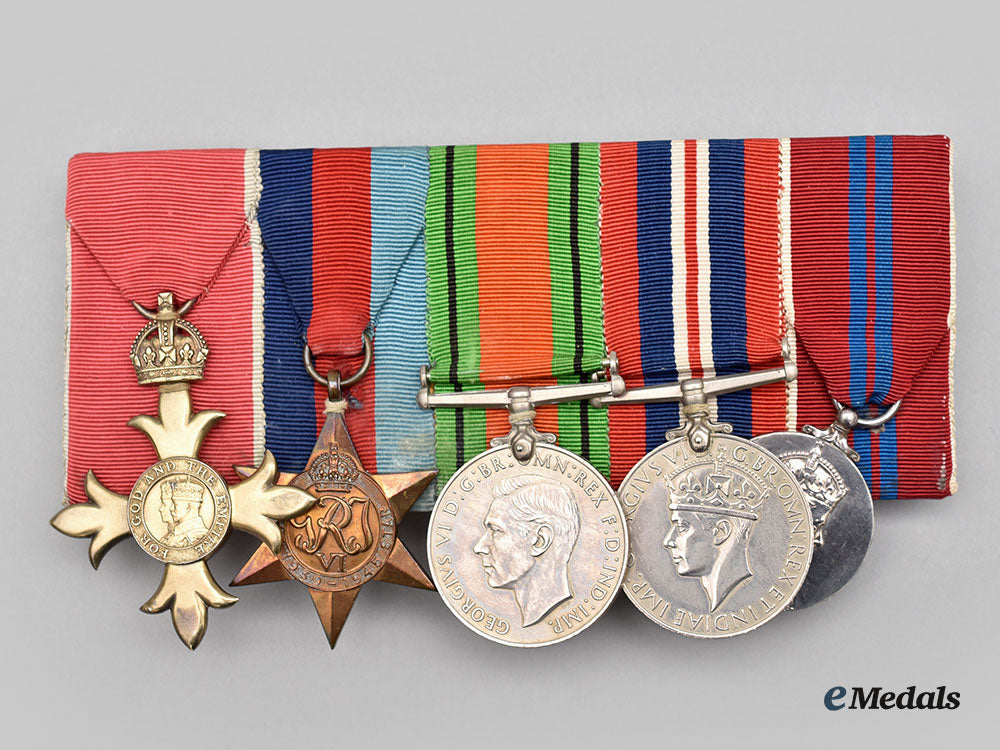
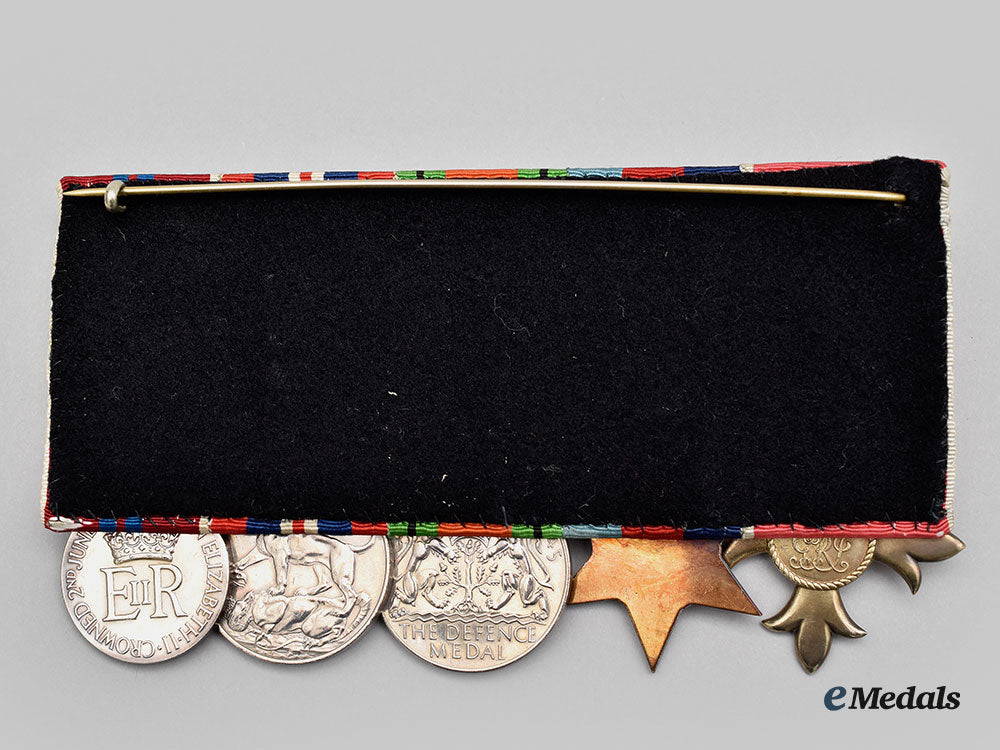
You May Also Like
Germany, SA. A Model 1933 Service Dagger, SA-Gruppe Nordsee, by Friedrich von der Kohlen
G59818
Germany, SA. A Model 1933 Service Dagger, SA-Gruppe Pommern, by Gustav Wirth
G59816
Germany, Third Reich. A Mixed Lot of Tyrolean Marksmanship Badges
G52930
Germany, SS. An Estonian Waffen-SS Volunteer’s Sleeve Shield
G50381
Germany, SS. A Waffen-SS Sturmmann Sleeve Insignia
G52846
-
Germany, SA. A Model 1933 Service Dagger, SA-Gruppe Nordsee, by Friedrich von der Kohlen
G59818
Add to CartRegular price $980 USDRegular price $0 USD Sale price $980 USDUnit price / per -
Germany, SA. A Model 1933 Service Dagger, SA-Gruppe Pommern, by Gustav Wirth
G59816
Add to CartRegular price $980 USDRegular price $0 USD Sale price $980 USDUnit price / per -
Germany, Third Reich. A Mixed Lot of Tyrolean Marksmanship Badges
G52930
Add to CartRegular price $135 USDRegular price $0 USD Sale price $135 USDUnit price / per -
Germany, SS. An Estonian Waffen-SS Volunteer’s Sleeve Shield
G50381
Add to CartRegular price $150 USDRegular price $0 USD Sale price $150 USDUnit price / per -
Germany, SS. A Waffen-SS Sturmmann Sleeve Insignia
G52846
Add to CartRegular price $135 USDRegular price $0 USD Sale price $135 USDUnit price / per
Do you have a similar item you are interested in selling?
Please complete the form and our client care representatives will contact you.
Sell Item